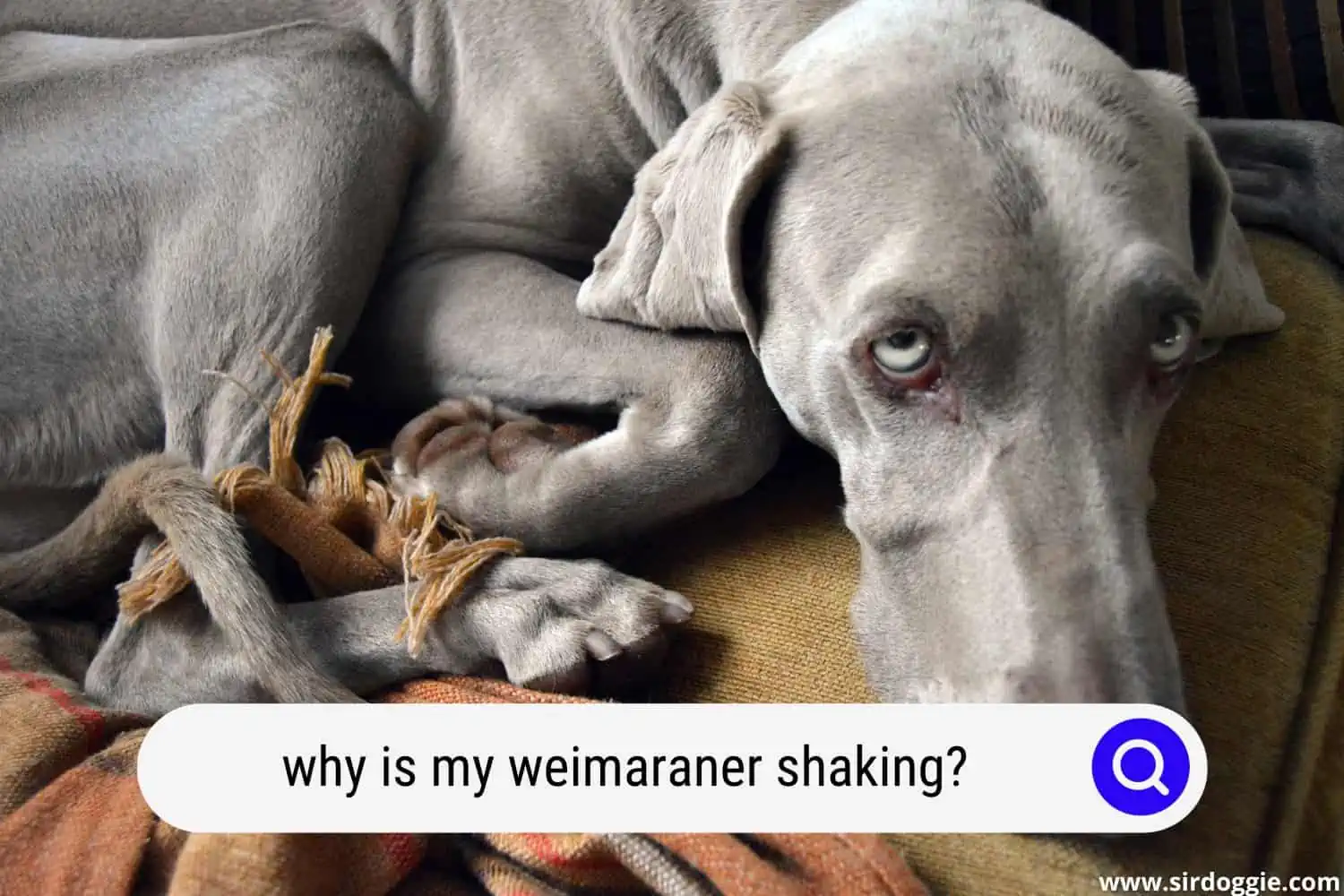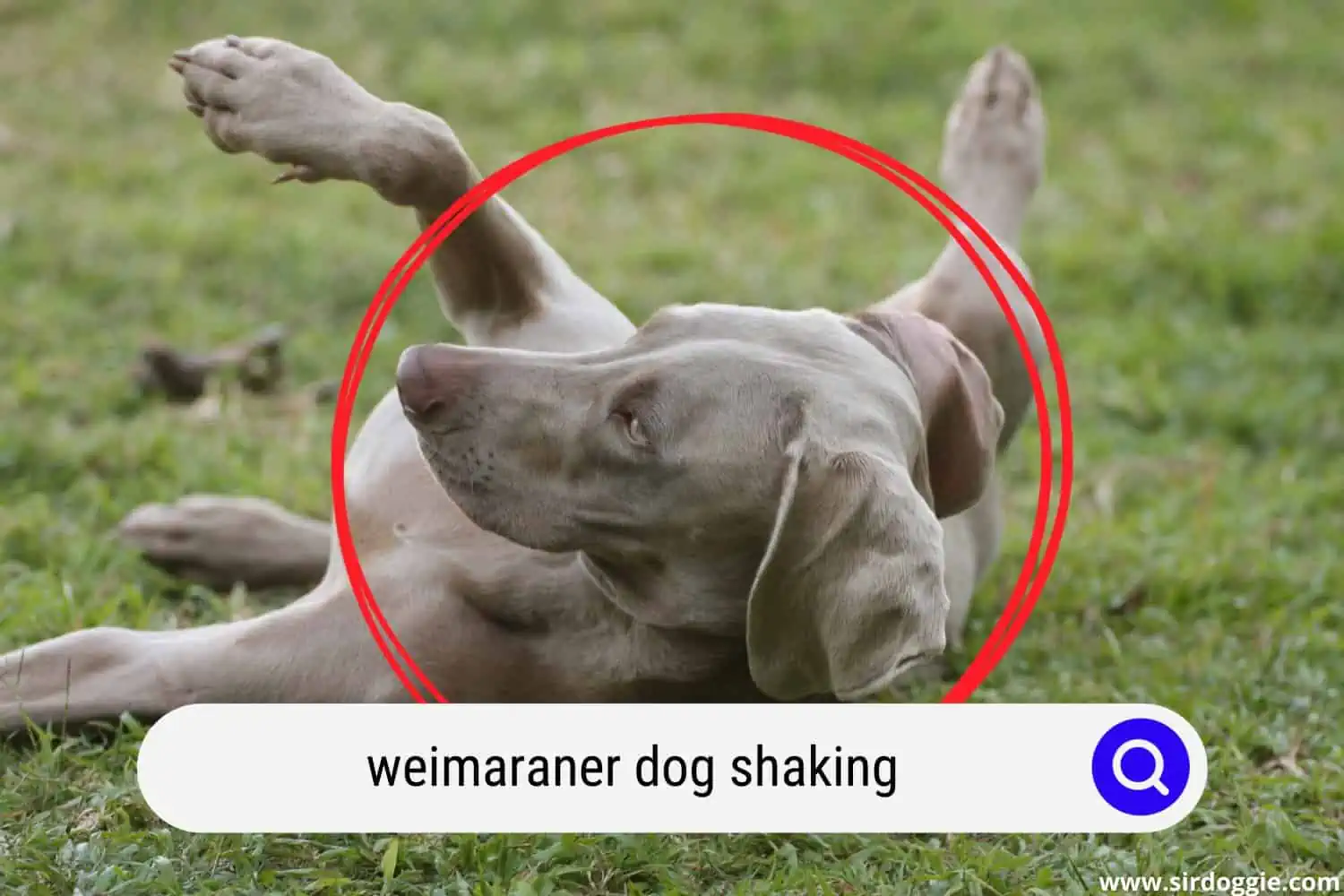Why Is My Weimaraner Shaking?
Many Weimaraner dog owners wonder why they sometimes observe their pets shaking. There are theories that it is only due to the cold of the environment, but it can also be due to a series of causes that harm the animal’s health.

Dogs have a vital system very similar to that of humans, so when it is cold, their body begins to emit small electrical discharges in the muscles, which originate the body’s involuntary vibration.
During these moments, the movement of the muscles produces heat, which our Weimaraner uses to alleviate its sensation of cold. We must remember that dogs have a higher body temperature than humans, and although they are covered in hair, they also suffer from cold.
Shaky Puppy Syndrome (SPS)
The shaky puppy syndrome or hypomyelination, also known as shaker puppy, is an inherited defect that causes a delay in the myelination of the nerves of the animal’s central nervous system.
This disorder has an impact on the central or peripheral nervous system of the dog’s brain. To this day, this syndrome has been described in various breeds of canines.
Among different breeds of dogs, the genetic cause of hypomyelination varies. While in Springer Spaniels, the disorder is progressive and related to the X chromosome, in Weimaraners, the disorder is autosomal recessive, and the symptoms of the affected canine decrease with aging.
Symptoms and Characteristics of Shaky Puppy Syndrome (SPS)
When puppies with this type of disorder are born, the first symptoms appear at 1-2 weeks of age. However, the exact age may vary depending on the canine.
Affected young dogs begin to show shakes, especially on the hind legs.
Canines with this syndrome to a greater degree may have problems breastfeeding in the future due to their shakes. After the lactation period, the affected dog will need to be fed alone, away from other puppies, and will often need assistance while eating.
The shaking episodes appear most severe during periods of excitement or exercise and lessen when the puppy is less active.
Causes of Weimaraner Shaking
Genetics of the Weimaraner
Shaky puppy syndrome is caused by a mutation in the gene that codes for protein 2 that interacts with folliculin (FNIP2), a protein expressed in both neurons and oligodendrocytes.
This mutation causes the expression of a truncated protein that is not functional and results in hypomyelination.
Canine hypomyelination or shaky puppy syndrome is inherited as an autosomal recessive trait. Healthy parents of an affected animal are obligate heterozygotes and therefore carry a mutant allele. Heterozygotes have no symptoms.
Other Causes
There are many reasons why a dog can have tremors, some of them are completely natural, and some others arise from other sources.
Weimaraner Pathological Shakes
There are many conditions or diseases that can occur with some type of shake in a Weimaraner dog. The most common are:
Weimaraner Hypoglycemia
A drop in sugar (glucose) can lead to a loss of balance and generate tremors in your pet. We recommend that if your dog has this case, always have a little honey in your bag to give to the animal.
Weimaraner Fever
If your dog has slight shakes and at the same time you notice it down, not wanting to move, or eat, etc.. It may be that its body temperature is high.
Weimaraner Distemper
It is a disease caused by a virus. It mainly affects puppies that have not been vaccinated. This disease has many forms, and one of them is neurological, with a serious prognosis.
In this case, the tremors can be accompanied by tics, loss of balance, and discomfort. It should be noted that in the most serious cases, your pet can suffer from seizures. Other symptoms usually appear before the neurological phase, such as digestive signs (vomiting and diarrhea), coughs, abundant mucus, conjunctivitis, and skin problems in other cases.
Weimaraner Pain
It is very typical that when dogs have gastroenteritis and pain in the abdomen area, they present some slight tremors. That is one of the shakes that most scares dog owners since, although the cause is small, it usually comes without anyone expecting it and for no apparent reason.
Most of the time, they are because of something they have eaten and should not eat it, but there are also many pathologies that can occur at the abdominal level accompanied by pain.
There may also be localized pain at the bone/muscle level and generate shakes in that area. That usually appears in senior dogs that have osteoarthritis or arthritis, where tremors are more frequent in the extremities.
Shaking After a Large Amount of Exercise
It is very typical in animals that do long mountain routes, races, etc., especially if they are not well trained. When resting, the muscles may present some involuntary tremors due to exertion. However, after a while, it relaxes.

Weimaraner Cold Shaking
When lowering the temperature of the environment, it is very common to observe your Weimaraner shaking in its bed. Through this, the canine looks for the best way to warm up to stop shaking, so it resorts to snuggling up to its owner, searching for comfort.
The reason is that these movements (tremors) are used in thermoregulation in order to increase the body temperature and soften the feeling of cold. Despite having their bodies covered in hair, they can also feel cold.
Weimaraner Shaking when Sleeping
Some Weimaraner canine owners become concerned when they see their animals sleeping and suddenly start to shake. Some of them even shake their limbs and may even bark.
It can usually mean that your pet just has a bad dream.
Weimaraner Shaking from Stress, Anxiety, or Fear
It is common to observe fear when your pet is exposed to something that makes it uncomfortable, such as fireworks or a visit to the veterinarian, even though the latter is necessary for the Weimaraner’s well-being. On occasion, the doctor offers treats to the dog to gain its trust.

Family Dog Expert Author
Hi there! I’m Stuart, a devoted dog lover and family dog expert with over a decade of experience working with our furry companions. My passion for dogs drives me to share my knowledge and expertise, helping families build strong, loving bonds with their four-legged friends. When I’m not writing for SirDoggie, you’ll find me hiking, playing with my beautiful dog, or studying music.